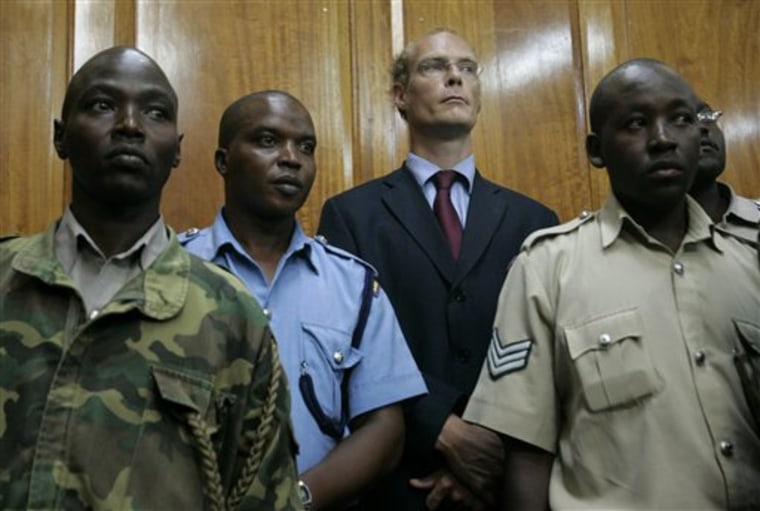One of Kenya's most famous white aristocrats was convicted of manslaughter Thursday in the shooting of a black poacher, a case that underlined sharp divisions over land, race and privilege in the African country.
Thomas Cholmondeley, 40, was originally charged with murder in the 2006 shooting of 37-year-old Robert Njoya.
The poacher had been accompanied by two machete-wielding friends and six dogs as they checked illegal traps on Cholmondeley's 56,000-acre Rift Valley farm.
But they unexpectedly ran into Cholmondeley and his friend, rally driver Carl "Flash" Tundo. Cholmondeley says he fired at the group to frighten off the dogs.
Bled to death after artery pierced
But Njoya was shot and he bled to death after an artery in his buttocks was pierced by a bullet.
Kenya's courts move at snail's pace and the case had been postponed various times over the past three years.
Judge Muga Apondi eventually dismissed the not-guilty verdict of two civilian lay assessors, reduced the charge to manslaughter, ruled Cholmondeley was guilty and said sentencing would be carried out Tuesday.
His sentence could range from the maximum of life imprisonment to counting the three years Cholmondeley has already served and letting him walk.
Defense lawyer Fred Ojiambo said any further prison time would be appealed.
The stifled gasps that greeted the judge's announcement soon turned to sobs and many of Cholmondeley's family friends left the court in tears.
Cholmondeley's parents watched as their son looked down, then straightened his shoulders before police led him away, riot shields protecting him from photographers. Sarah Njoya, the dead man's widow, smoothed down her simple white headscarf and folded her hands in her lap.
Widow doesn't want additional jail time
Later, she said she hoped Cholmondeley — a father of two — would not receive additional jail time, fearing his family could run into the kind of difficulties she has had in bringing up her four young sons.
"I think that those who killed my husband should be set free but pay for my children's school fees and upkeep so they are like normal children," she said. "There is no need for him to be hanged or jailed ... then his wife would have problems like me. The important thing now is to know how my children will survive."
Njoya's death was made more controversial because it was the second time in just over a year that Cholmondeley was implicated in a fatal shooting on his family's farm. The first case, in which an off-duty game warden was killed, was dismissed for lack of evidence. That prompted angry protests from some villagers already resentful of what they saw as colonial-era intrusion into their traditional lands.
After Kenya's independence from Britain in 1963, many departing settlers transferred land to Africans, with the British government underwriting some of the costs. Some settlers, including Cholmondeley's family, kept their land and became Kenyan citizens.
Concerns about reverse prejudice
Now, some of Cholmondeley's supporters argue reverse prejudice makes it politically inexpedient to free an innocent man. They echo land reform advocate Odenda Lumumba, who thinks keeping anger focused on white landowners may be a strategy to help deflect attention from the vast tracts of land stolen by Kenyan politicians.
"People can no longer take the levels of poverty and inequity in the country. They are looking for a scapegoat. It can be the ethnic group in power, or the ethnic group they see next to them," he said.
"The way in which this has been handled makes people suspicious that it is a smoke screen. People are worried. They are saying that some of the politicians might be using this case to acquire land from the Delamere family."
Family drama provided inspiration for book
Cholmondeley's grandfather, the fourth Baron Delamere, was the third husband of Diana Broughton, a blond socialite whose lover was shot in the head on the outskirts of Nairobi in the 1940s. Broughton's previous husband was tried for the murder and acquitted, an episode that inspired the book "White Mischief," which also was made into a 1987 film starring Charles Dance and Greta Scacchi.
At Nairobi's exclusive Muthaiga club, few of Cholmondeley's supporters are willing to discuss the case publicly.
The trial has been a largely unwelcome spotlight on the wild lives of some of Kenya's colonial-era families. Best known for adultery and alcoholism, the wild parties of the fast set earned the area around Cholmondeley's family farm the sobriquet "Happy Valley."
Near the family farm, steam still rises from the distant dormant volcano and hippos in the lake yawn at flocks of flamingos flying overhead.
But Cholmondeley — educated at Eton, one of Britain's most exclusive schools — now sees prison rats, violent warders and the concrete walls of a maximum-security prison.
From behind paint-chipped bars, he told visiting journalists this week he desperately hoped to come home. His defense had hinged on the so-called "second gun" defense which implied the friend who accompanied him the day of the murder may have fired the fatal shot.
But Tundo denied having or firing a gun and no ballistics evidence was produced to prove another weapon was fired other than Cholmondeley's Winchester hunting rifle. The two men are no longer speaking.
Apondi ruled Cholmondeley did not intend to kill Njoya, pointing to the first aid the aristocrat administered to the wounded man before driving him to hospital and Cholmondeley's voluntary co-operation with the police.
"With the benefit of hindsight, the accused should have shot in the air," the judge said.
